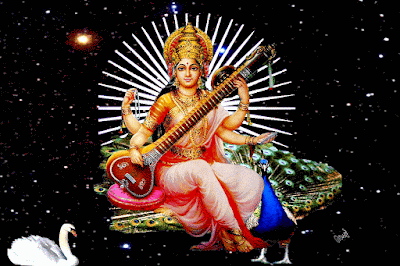Is Achintya (the "Imponderable, Inconceivable, Indescribable") the greatest Hindu God we've never heard of?
 |
| America's greatest Hindu: Julia Roberts |
(Praveen Mohan) Sept. 20, 2024: A strange statue is found in the ancient Hindu temples of Bali. This God has tridents sticking out of it. Who is it? Balinese people call this deity Achintya, but the symbolism is mysterious. Let's decode it.
Whatsapp channel https://whatsapp.com/channel/0029Va9U Instagram praveenet Facebook praveenmohanfansTwitter iampraveenmohanEmail ID: info.praveenmohan@gmail.com. Patreon for support: praveenmohan. Join channel to get access to perks: @realpraveenmohan. #praveenmohan #hinduism #god
COMMENTARY
 |
| Fun during Holi near vimana ashram temple |
In the Buddhist view, the "creator God" is Maha Brahma, but there are other divine (
deva) creators in higher worlds. Of all these deities, there is no real "creator." How can that be? To the extent that these being make anything, they are creating. But what is it that Christians, Hindus, Muslims, Jews, and other polytheists who became monotheists believe give "God" His "creator" status.
It is the belief that God created souls (selves, egos, personalities with bodies of different kinds), this immortal (the part of us that does not die at death) thing we imagine ourselves to be. Those strands of being (processes of becoming) already existed to the extent they exist, which is utterly dependent on their constituents. "God" did not create that.
 |
| Vimanas (UFOs) inspire Hindu temple designs |
And though a God or god creates an entire world, world-system (
cakkavala), or universe, it does not actually people it with new creations. Parents do not birth new beings into being, even though our materialistic science says they do. We, when making a terrarium, do not fabricate ants or other creatures to occupy it. They preexist and come in by invitation or otherwise.
 |
| This "mothership" vimana is biggest ashram |
They have no discernible beginning and will not come to an end by simply dying. So whether the Great (
maha) Supremo (
brahma) reappears at the beginning of another cycle (
yuga) or not, all those who follow and subsequently reappear are not appearing for the first time due to this one being's magic, will, or wish.
This may be how it seems, but it is not how it is. It is unclear if Hinduism understands this any better than the Abrahamic faiths, but it is perfectly clear in the Buddha's rejection of an ultimate "creator" or "creation." It is the same spinning cycle that originates depending on impersonal conditions (which are taken to be very personal), the Five Aggregates clung to as "self." What are they? They are:
- forms (bodies, material bases, whether subtle or gross);
- feelings
- perceptions
- formations
- consciousness(es).
 |
| Don't eat your fellow earthlings. Go vegan. |
All five are constituent processes, not independent things. And while it may not make sense to say "forms" when we customarily say form, this body (like all our previous and future bodies) is not one unitary, independent thing. It is utterly dependent on the Four Elements (the four
qualities of materiality, which themselves are constituent processes, not actual, tangible, elemental "things" like the way we imagine atoms or particles to be).
 |
| What does Julia Roberts know that we don't? |
Similarly, "consciousness" is NOT one thing. It is not a thing at all but rather an impersonal process taken as personal. There is not one consciousness, but rather there are many mind moments (
cittas) and submoments (phases of a moment) in a stream, taken to be one stream as if any stream or river were one thing rather than trillions of ever-moving water molecules passing in and sublimating out of what is regarded as one stream/river.
All of these things are ponderable; moreover, they are discernible and potentially directly visible, not theoretical or something to debate. The Buddha taught them as a means of letting go for the gaining of freedom from all suffering and further rebirth (moksha, liberation, enlightenment, and nirvana). He also taught about Four Imponderables (catu-acintiyas). On the list of these four things, God is not one of them. God very much is ponderable, knowable, attainable. Mysterious to be sure but able to be revealed. So whom did or do the Hindus of Bali regard as the highest Hindu God, Guru Mohan?
































































































































































































































































No comments:
Post a Comment